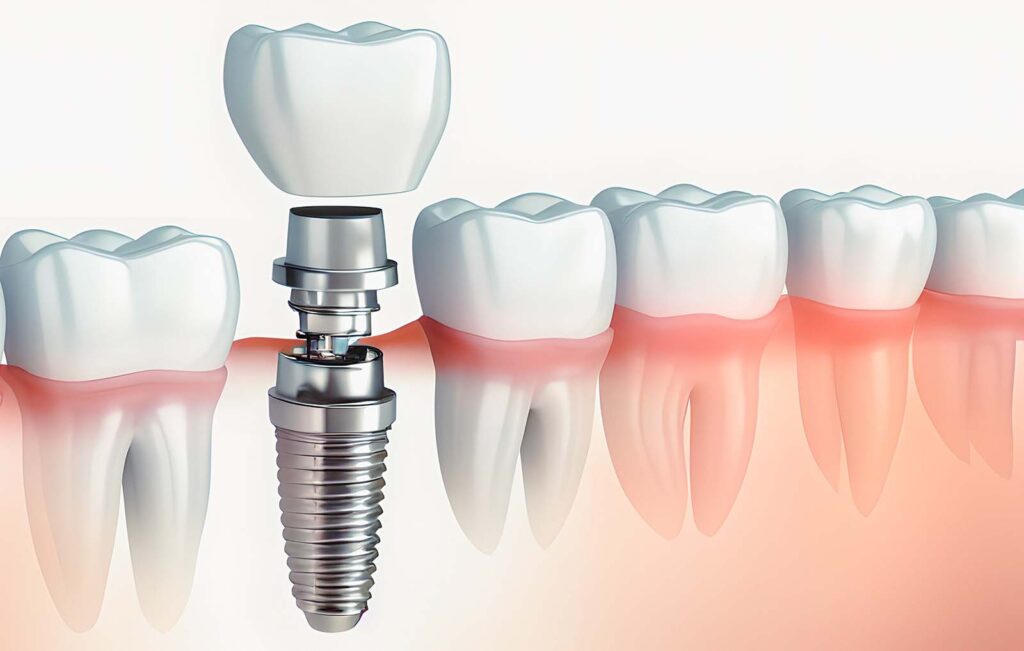The Benefits and Considerations of Dental Implants: A Comprehensive Guide.
Introduction to Dental Implants
Dental implants have a rich history and have significantly evolved. They offer a permanent solution for missing teeth, providing a more natural feel and functionality compared to other options. Dental implants are artificial tooth roots, typically made of titanium, that are surgically placed into the jawbone to support a replacement tooth or bridge.

Benefits of Dental Implants
Better Looks and Self-Esteem
Dental implants look and feel like natural teeth, which can enhance your appearance and boost your self-esteem. Unlike dentures, implants are designed to fuse with the bone, offering a more permanent solution.
More Comfortable than Dentures
Unlike removable dentures, dental implants are fixed in place, providing greater comfort and stability. This eliminates the discomfort of removable dentures and the need for adhesives.
Improved Oral Health and Hygiene
Implants do not require the reduction of adjacent teeth, as is necessary with bridges. This helps maintain more of your natural teeth, improving long-term oral health. Additionally, individual implants allow easier access between teeth, improving oral hygiene.
Durability and Long-Term Benefits
Dental implants are highly durable and can last many years, often a lifetime with proper care. Their longevity makes them a cost-effective option in the long run.
Better Speech and Easier Eating
Poorly fitting dentures can slip within the mouth, causing you to mumble or slur your words. Dental implants allow you to speak without the worry that teeth might slip. Additionally, they function like your own teeth, allowing you to eat your favorite foods confidently and without pain.
The Dental Implant Procedure
Initial Consultation and Assessment
The process begins with a thorough dental examination, including X-rays and models of your teeth and mouth. This helps in developing an individualized treatment plan.
Surgery: What to Expect
During the surgery, the dentist places the implant into the bone socket of the missing tooth. The jawbone then heals, growing around the implant and securing it firmly in the jaw. This process can take 6 to 12 weeks.
Healing Process and Osseointegration
Osseointegration is the process by which the jawbone firmly attaches to the dental implant. This ensures that the implant is stable and can support the new artificial tooth.
Emplacement of the Abutment and Crown
Once osseointegration is complete, a small connector post, called an abutment, is attached to the implant to hold the new tooth securely. A replacement tooth, or crown, is then attached to the abutment.
What to Consider Before You Get Dental Implants
Eligibility: Who Are Good Candidates?
Not everyone is a suitable candidate for dental implants. Good candidates are those with healthy gums and enough bone to hold the implant. They must also be committed to maintaining good oral hygiene and regular dental visits.
Health Conditions that Interfere with Implant Success
Certain health conditions, such as uncontrolled diabetes or heart disease, may affect the success of the implants. Smokers may also face a higher risk of implant failure.
Importance of Bone Density in the Jawbone
Sufficient bone density is crucial for the support of the implant. If there isn’t enough bone, you might need a bone graft.
Cost Considerations and Insurance Coverage
Dental implants can be more expensive than other tooth replacement options. Costs vary depending on the number of implants needed and the condition of the jawbone. While some insurance plans may cover part of the cost, many do not.
Risks and Complications
As with any surgery, dental implants carry some risks, including infection, nerve damage, and sinus problems. It’s important to discuss these risks with your dentist.
Post-Implant Care and Maintenance
Oral Hygiene Practices
Good oral hygiene practices, such as brushing, flossing, and using an antibacterial mouthwash, are essential to maintain the health of the implants.
Regular Dental Check-Ups
Regular check-ups with your dentist are important to ensure the implants function properly and catch any potential issues early.
Lifestyle Modifications for Implant Longevity
Certain lifestyle changes, such as quitting smoking and avoiding hard foods, can help extend the life of your dental implants.
Comparison of Dental Implants with Other Replacement Options
Dentures: Pros and Cons
Dentures are removable and can be a less expensive option. However, they can be uncomfortable, may slip, and require more maintenance.
Bridges: Advantages and Disadvantages
Bridges are fixed and can provide a more natural look and feel than dentures. However, they require the reduction of healthy teeth and may not last as long as implants.
Why Dental Implants Might Be the Better Option
Dental implants offer the best long-term solution for tooth replacement, providing stability, durability, and a natural appearance without affecting adjacent teeth.
Common Concerns and How They Were Addressed
Common concerns include pain during the procedure, recovery time, and cost. Patients have found that with proper care and guidance from their dental professionals, these concerns are manageable.
Dental Implant Technology: Future Trends
Innovations and Advances in Implant Materials and Techniques
Ongoing research and technological advancements are continually improving the materials and techniques used in dental implants, making them more effective and accessible.
The Role of Digital Dentistry in Implant Planning and Placement
Digital dentistry, including 3D imaging and computer-aided design/manufacturing, plays a crucial role in the precise planning and placement of dental implants, ensuring better outcomes and patient satisfaction.
Dental implants offer a reliable and lasting tooth replacement solution, enhancing functionality and aesthetics. With careful consideration and proper care, they can significantly improve their quality of life. If you are looking for dental implants in Simi Valley, our clinic provides top-notch services. Contact Us Today